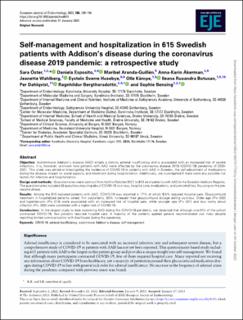| dc.contributor.author | Öster, Sara | |
| dc.contributor.author | Esposito, Daniela | |
| dc.contributor.author | Aranda-Guillén, Maribel | |
| dc.contributor.author | Åkerman, Anna-Karin | |
| dc.contributor.author | Wahlberg, Jeanette | |
| dc.contributor.author | Husebye, Eystein Sverre | |
| dc.contributor.author | Kämpe, Olle | |
| dc.contributor.author | Botusan, Ileana Ruxandra | |
| dc.contributor.author | Dahlqvist, Per | |
| dc.contributor.author | Bergthorsdottir, Ragnhildur | |
| dc.contributor.author | Bensing, Sophie | |
| dc.date.accessioned | 2023-10-20T12:58:17Z | |
| dc.date.available | 2023-10-20T12:58:17Z | |
| dc.date.created | 2023-06-21T12:38:25Z | |
| dc.date.issued | 2023 | |
| dc.identifier.issn | 0804-4643 | |
| dc.identifier.uri | https://hdl.handle.net/11250/3097832 | |
| dc.description.abstract | Objective
Autoimmune Addison's disease (AAD) entails a chronic adrenal insufficiency and is associated with an increased risk of severe infections. It is, however, unknown how patients with AAD were affected by the coronavirus disease 2019 (COVID-19) pandemic of 2020-2021. This study was aimed at investigating the incidence of COVID-19 in patients with AAD in Sweden, the self-adjustment of medications during the disease, impact on social aspects, and treatment during hospitalization. Additionally, we investigated if there were any possible risk factors for infection and hospitalization.
Design and methods
Questionnaires were sent out from April to October 2021 to 813 adult patients with AAD in the Swedish Addison Registry. The questionnaires included 55 questions inquiring about COVID-19 sickness, hospital care, medications, and comorbidities, focusing on the pre-vaccine phase.
Results
Among the 615 included patients with AAD, COVID-19 was reported in 17% of which 8.5% required hospital care. Glucocorticoid treatment in hospitalized patients varied. For outpatients, 85% increased their glucocorticoid dosage during sickness. Older age (P = .002) and hypertension (P = .014) were associated with an increased risk of hospital care, while younger age (P < .001) and less worry about infection (P = .030) were correlated with a higher risk of COVID-19.
Conclusions
In the largest study to date examining AAD during the COVID-19 pandemic, we observed that although one-fifth of the cohort contracted COVID-19, few patients required hospital care. A majority of the patients applied general recommended sick rules despite reporting limited communication with healthcare during the pandemic. | en_US |
| dc.language.iso | eng | en_US |
| dc.publisher | Oxford University Press | en_US |
| dc.rights | Navngivelse 4.0 Internasjonal | * |
| dc.rights.uri | http://creativecommons.org/licenses/by/4.0/deed.no | * |
| dc.title | Self-management and hospitalization in 615 Swedish patients with Addison's disease during the coronavirus disease 2019 pandemic: a retrospective study | en_US |
| dc.type | Journal article | en_US |
| dc.type | Peer reviewed | en_US |
| dc.description.version | publishedVersion | en_US |
| dc.rights.holder | Copyright 2023 The Author(s) | en_US |
| cristin.ispublished | true | |
| cristin.fulltext | original | |
| cristin.qualitycode | 2 | |
| dc.identifier.doi | 10.1093/ejendo/lvad010 | |
| dc.identifier.cristin | 2156571 | |
| dc.source.journal | European Journal of Endocrinology (EJE) | en_US |
| dc.source.pagenumber | 189-196 | en_US |
| dc.identifier.citation | European Journal of Endocrinology (EJE). 2023, 188 (2), 189-196. | en_US |
| dc.source.volume | 188 | en_US |
| dc.source.issue | 2 | en_US |

